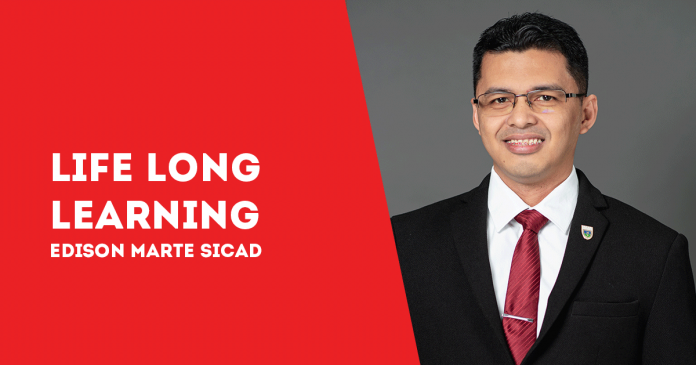
BY EDISON MARTE SICAD
ACCEPTING personal responsibility is not about giving up trusting other people; neither is it an assertion of self-sufficiency. I do admit that we value independence with a sort of leave-me-alone mantra. But the reality is that we do need each other. And this is where responsibility, as an attribute of self, is contextualized.
In general, we all have inherent rights rooted in the dignity of man. But in a civilized society, we need to deal with each other; and this is where the clash of concerns and the value of respect enter the picture. Further, there is a thin line between assertion and arrogance, as well as between tolerance and acceptance. Sometimes, most of our complaints—which we may argue as a deprivation or violation of our human rights—can be solved if we put into the equation our own maturity: a proactive approach especially in times of highly emotional situations.
In particular, how can a student become more responsible?
It is my personal opinion that students have less rights to protect or complain about; they have more responsibilities to do—whether they like it or not.
For me, here are the things a student must take into consideration to become a successful learner, and eventually to develop good habits and become a mature person:
1. Focus on effort, not on grades.
This aspect could be influenced by your personal goals—or the opinions of your parents and peers. As a student, have a sense of ownership to your learnings, and a sense of fulfillment to the outcome or results of your exams.
2. Practice a social media detox.
Be vigilant with your choices for these define your sense of self. Be careful of the mindset “My feeling good mostly depends on social media interactions.”
I am not saying that you delete your digital existence. Again, the word is Responsibility. Just be aware and cautious of your screentime. In the same manner that you won’t allow the trash of other people to be thrown inside your house, you must also be hygienic in your socmed activities. Unwittingly, we allow nonsensical “stinky” content to enter our senses.
And although expressing your concerns in socmed can be therapeutic, it must somehow also be didactic. For your post will be seen by anyone and a lot can be lost in translation.
3. Believe in a Higher Power AND do everything that you can.
As the saying goes, “All you can do, is all you can do. But make sure that you do all you can do.”
Excellence is an expected goal or mission of an educational institution. But this is just half of the story. The student must also be driven to excel. Have the confidence of setting goals and the discipline to push thru despite anything or anyone.
For it is not in the winning that you will know who you really are; it is in times of defeat, in failing—verging towards hopelessness and helplessness—when you will get to meet the real you.
Take risks and learn from mistakes. Be humble but ambitious. Do not limit your dreams and do not belittle your efforts.
Freedom is not about freeing yourself from the shackles of society, it is setting yourself free from the tyranny of your own mediocre mind.
OBVIOUSLY, all these are easier said than done. But remember, the more you say that you can’t do it, the higher the probability that you won’t be able to do it. So, if words can influence results, then choose to say things that can give you strength—literally—when things get tough.
We have to function from strength. And this means taking responsibility—or doing the tasks we are expected to do: to be a student IS TO STUDY. Whether the lessons are made difficult or easy by your teachers, you have to study.
Student-life is like preparing for war. A soldier may complain how difficult the training is, but no one in his right mind will expect that the enemy would be “nice.”
By analogy, you will have many “enemies”. In living your life, especially when you are already working, you will surely be tested as to how tough you are. In fact, your classmates could be your competitors in job applications and promotions—could even be your boss.
So, toughen up. Instead of complaining “this is too much.” Say, “Is this all you’ve got? Bring it on.”/PN







